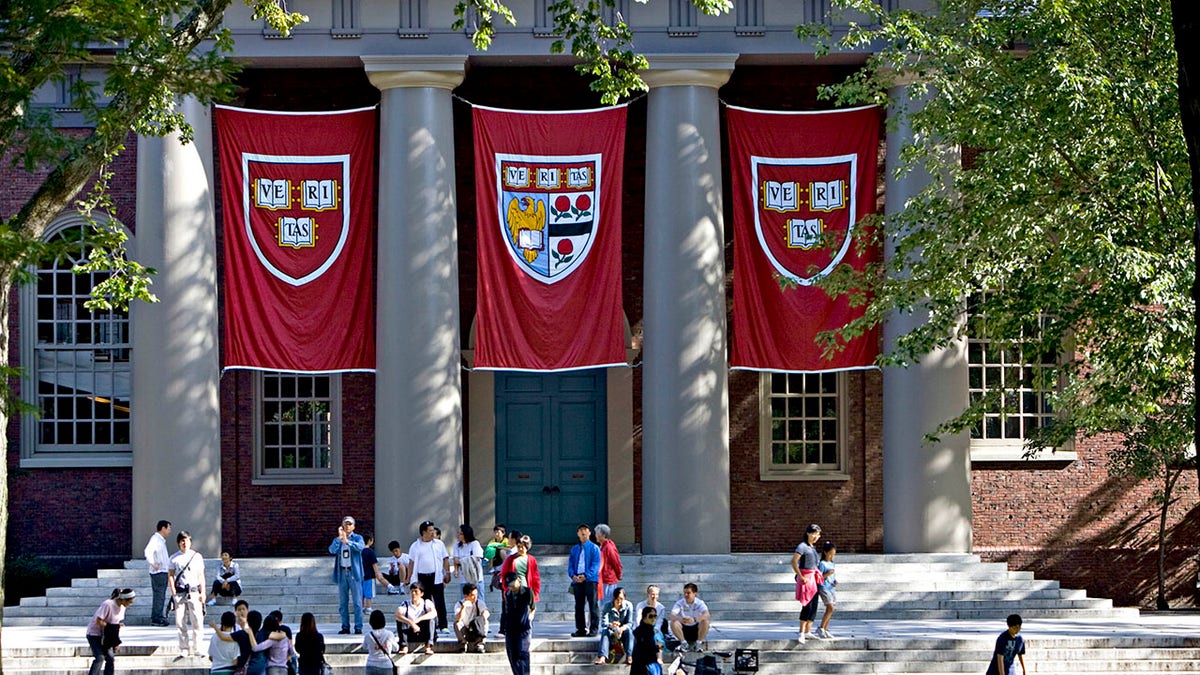Harvard grad: 'Terrifying' it's become acceptable under guise of free speech to speak out against Jews
Harvard graduate Samantha Ettus weighs in as colleges across America face increasing pressure to address antisemetism amid anti-Israel protests on 'Your World.'
As antisemitic rhetoric and attacks have increased at some of America's leading institutions, Jews on college campuses have been left scratching their heads, asking how it is possible that progressives could present the veneer of tolerance and modern thinking, while celebrating Hamas' barbarity and embracing hate.
But, in fact, "progressive" intolerance is nothing new for college campuses, with antisemitism and even Nazism part of many universities' dark pasts. Jay Richards of the Heritage Foundation raised eugenics as another example.
"It's hard for us to imagine now, but it was an idea that was shared by essentially all elite opinion makers and institutions in the early 20th century, especially as part of the wider progressive movement," he said. "In many ways, it was developed in the United States in the 1920s and exported to Germany and [they]… really actually implemented it with that kind of dramatic efficiency."
Adolf Hitler was a great admirer of American academics' work to advance eugenics. Eugenics is the study of how to arrange reproduction within a human population to increase the occurrence of characteristics regarded as desirable – and to weed out what scientists viewed as undesirable.
100 HARVARD FACULTY CRY FOUL AT UNIVERSITY'S 'COMBATING ANTISEMITISM' INITIATIVE

California's Legislative Jewish Caucus called on university leaders to address the growing problem of antisemitism on campus and protect Jewish students. (Getty Images)
Biologist Steven Farber argued that academic articles published by eugenicists like Charles B. Davenport – who lectured at Harvard, the University of Chicago, and Carnegie Institution – were the "intellectual underpinnings" of the Nazis' racial social policies.
According to the U.S. Holocaust Museum, "Eugenic theory provided the basis for the Nazis' clandestine program that killed disabled Germans, an estimated 250,000 patients," before it was later turned against Jews, Roma, homosexuals and other groups deemed inferior as part of "racial hygiene."
In addition to embracing hateful and faux-scientific ideology, and embedding eugenics in its biology textbooks, some college administrators were openly antisemitic while leading institutions that limited the acceptance of qualified Jewish students.
SCANDAL-PLAGUED LIBERAL COLLEGE FACES NEW PROBE OVER ANTISEMITISM, EMBRACE OF HAMAS
Yale, for example, has a document in its archives entitled "Jewish Problem" from 1922 which pushed for quotas on "the alien and unwashed element." Jewish enrollment was subsequently held at 10% for four decades, according to a book written by a former Yale student called "Joining the Club."

Students participate in a protest in support of Palestine outside of the Columbia University campus on November 15, 2023 in New York City. (Spencer Platt/Getty Images)
"There were vicious, ugly forms of discrimination at Yale, as with the larger society," Yale University's former secretary, John A. Wilkinson, told The New York Times in the 1980s about the finding. "It's part of our history, and we should face up to it."
Other elite institutions, such as Columbia University, Princeton and Harvard, had similar policies in place. The Harvard Crimson reported, "Over the course of the 1920s, Harvard’s administration passed a series of admissions policies to limit the percentage of Jewish students in each incoming class. These policies were the first attempts in Harvard's history to restrict the admission of qualified applicants."
The antisemitism didn't stop there during that time period, particularly for Harvard.
One of the late scholars on the topic of higher education and its complicity with bolstering Nazi German propaganda, Stephen Norwood, documented how elite institutions invited Nazis to speak at their universities, participated in foreign exchange programs to bring in indoctrinated students and Nazi professors and allowed Nazi ideology to spread to their peers and the West more broadly.

Multiple angles of pro-Palestinian protests at Harvard Business School on Wednesday, Oct. 18. (Fox News)
BRANDEIS UNIVERSITY BANS STUDENTS FOR JUSTICE IN PALESTINE FOR ITS SUPPORT OF HAMAS
In fact, "German exchange students had been directed to act as agents of the German Government on American... campuses," the New York Times reported. The German propaganda campaign targeting the U.S., which included Nazis giving tours to exchange students and professors, attracted the concern of members of Congress, who formed the "House Un-American Activities Committee" to investigate.
There are many examples of how Nazi ideology became acceptable opinion on campuses. In 1939, after the Nazis' Kristallnacht pogrom was widely publicized, Princeton's first-year students chose Adolf Hitler as "the greatest living person," according to a New York Times article from the time.
A few years after Hitler took power, "the Harvard administration permitted Nazi Germany's consul general in Boston to place a wreath bearing the swastika emblem" on its campus, Norwood wrote.
Much of Norwood's ire was directed at Harvard's former president, James Bryan Conant, who he believed "ignored numerous opportunities to take a principled stand against the Hitler regime and its antisemitic outrages, and contributed to Nazi Germany's efforts to improve its image in the West."

Harvard banners hang outside Memorial Church on the Harvard University campus in Cambridge, Massachusetts, on Friday, Sept. 4, 2009. (Photo by Michael Fein/Bloomberg via Getty Images)
Norwood also believed that "Conant also displayed impatience with, and often contempt for, Jewish and other activists determined to publicly expose Nazi barbarism," even though "Conant did express formal opposition to Nazism, and never assumed the role of public apologist."
Under Conant's purview, Harvard "warmly welcomed" Nazi leaders to campus, "inviting them to prestigious, high-profile social events, and striving to build friendly relations with thoroughly Nazified universities in Germany, while denouncing those who protested against these actions," even as The Third Reich "intensified its persecution of Jews," he continued.
Other institutions, such as Columbia, accepted invitations to attend a festival at Heidelberg University, the site of the infamous and antisemitic 1933 book burning and a nexus of Nazi indoctrination, despite massive pushback from its students.
Columbia University's president, Nicholas Murray Butler also "lashed out viciously against Columbia students who publicly protested Nazi crimes," Norwood wrote.
"Columbia President Nicholas Murray Butler, whose views on international affairs the press quoted more frequently during the 1930s than those of any other higher education leader, was in a position to heighten public awareness of the menace of fascism. It is lamentable that for several critical years he failed to use his influence against barbarism, and chose instead to cooperate with the Hitler and Mussolini regimes in improving their image in the West."

Supporters of Palestinians gather at Harvard University to show their support for Palestinians in Gaza at a rally in Cambridge, Massachusetts, on October 14, 2023. (Photo by JOSEPH PREZIOSO/AFP via Getty Images)
CLICK HERE TO GET THE FOX NEWS APP
Fox News Digital reached out to Columbia, Princeton, Harvard and Yale for comment but did not immediately receive a response.
For more Culture, Media, Education, Opinion, and channel coverage, visit foxnews.com/media.




















